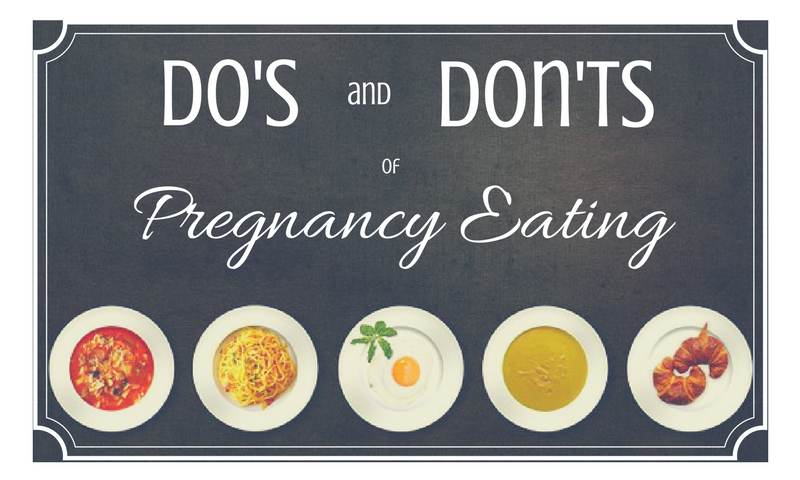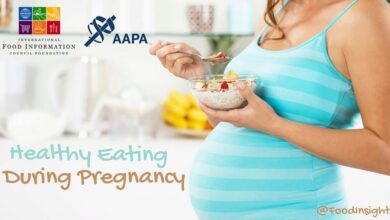
Dont eat for two while pregnant – Don’t eat for two while pregnant! This common misconception can lead to unnecessary weight gain and potential health problems for both you and your baby. This guide dives deep into the truth behind this popular belief, exploring the real nutritional needs of a pregnant woman and debunking the myths surrounding “eating for two.” We’ll cover everything from understanding the physiological changes during pregnancy to healthy dietary habits, managing cravings, and seeking professional guidance.
Understanding your body’s unique needs during pregnancy is crucial for a healthy outcome. This article provides a comprehensive look at the topic, from the basics of “eating for two” to managing potential cravings and seeking professional guidance. We’ll explore the myths, healthy dietary plans, and the importance of maintaining a healthy weight throughout your pregnancy journey.
Understanding the Concept of “Eating for Two”
The common belief that pregnant women need to eat for two is a widespread misconception. While pregnancy necessitates adjustments to a woman’s diet, it’s not about doubling her current intake. A balanced and nutritious diet is crucial for both the mother’s and the developing fetus’s health. This article delves into the nuances of pregnancy nutrition, dispelling myths and providing accurate information.The physiological changes during pregnancy affect nutritional needs.
The growing fetus requires nutrients for development, and the mother’s body also undergoes significant metabolic changes. These changes necessitate an increase in certain nutrients to support both the mother and the growing baby. This isn’t a simple doubling of intake; rather, it’s about meeting specific nutritional demands at each stage of pregnancy.
The Myth of “Eating for Two”
The idea of “eating for two” often leads to excessive food consumption. This can result in unwanted weight gain, potentially increasing the risk of gestational diabetes and other complications. Instead of focusing on doubling caloric intake, pregnant women should concentrate on consuming a balanced diet rich in essential nutrients. The focus should be on quality over quantity.
Physiological Basis of Pregnancy and Nutritional Needs
Pregnancy involves significant physiological changes. The developing fetus draws nutrients from the mother’s bloodstream, demanding increased intake of certain nutrients. The mother’s body also undergoes hormonal shifts that affect metabolism and nutrient absorption. These factors dictate a careful consideration of nutritional needs. A woman’s nutritional needs during pregnancy differ significantly from her needs when not pregnant.
Nutritional Needs of a Pregnant Woman
A balanced diet during pregnancy is paramount. This diet should encompass a wide variety of nutrient-rich foods, including fruits, vegetables, whole grains, lean proteins, and healthy fats. Essential vitamins and minerals play crucial roles in fetal development.
- Folate is critical for preventing neural tube defects in the developing fetus. Good sources include leafy green vegetables, fortified grains, and legumes.
- Iron is vital for red blood cell production, both for the mother and the growing baby. Red meat, beans, and leafy green vegetables are excellent sources. Iron deficiency can lead to anemia, affecting both mother and child.
- Calcium is essential for bone development in the fetus. Dairy products, leafy green vegetables, and fortified foods are good sources. Calcium deficiency can have implications for the mother’s bone health as well.
- Vitamin D supports calcium absorption and plays a crucial role in overall health. Fatty fish, egg yolks, and fortified foods are good sources.
Potential Negative Consequences of Excessive Food Consumption
Consuming excessive amounts of food during pregnancy can lead to several negative consequences. Unnecessary weight gain can increase the risk of complications during pregnancy and childbirth. It can also contribute to long-term health problems for both the mother and the child. This is a significant factor to consider.
Comparison of Nutritional Needs
The nutritional needs of a pregnant woman differ from those of a non-pregnant woman. The pregnant woman needs to increase her intake of certain nutrients to support the growing fetus. This increased requirement must be met through a balanced diet, not simply by overeating.
Importance of Balanced Nutrition
Balanced nutrition throughout pregnancy is essential for both the mother’s and the baby’s well-being. A diet rich in essential nutrients supports healthy fetal development, reduces the risk of complications, and ensures a healthy pregnancy outcome. It is crucial to emphasize the importance of a varied diet.
Recommended Daily Calorie Intake for Pregnant Women
The recommended daily calorie intake for pregnant women varies based on their pre-pregnancy weight and activity level. A healthcare provider can determine the appropriate calorie intake for an individual.
| Trimester | Recommended Daily Calorie Intake (approximate) |
|---|---|
| First Trimester | +300 calories |
| Second Trimester | +350 calories |
| Third Trimester | +400 calories |
Note: These are approximate values and may vary based on individual needs. Consult a healthcare professional for personalized guidance.
Misconceptions and Myths Surrounding “Eating for Two”

The phrase “eating for two” is a common misconception that often leads to unhealthy eating habits during pregnancy. While pregnancy requires adjustments to your diet, it’s crucial to understand the correct nutritional needs to support a healthy pregnancy and the well-being of both mother and child. This section will debunk common myths and misconceptions surrounding this concept, highlighting the potential harm of believing them and providing the correct dietary advice.The idea of “eating for two” is often misinterpreted as needing to double your food intake.
This inaccurate notion stems from a historical lack of understanding about pregnancy nutrition. The concept has been passed down through generations and cultural norms, further perpetuating the myth. It’s crucial to understand that while pregnancy requires additional nutrients, the increase isn’t necessarily a doubling of food intake.
Common Myths and Their Sources, Dont eat for two while pregnant
Many myths about pregnancy nutrition are perpetuated by outdated beliefs and lack of accurate information. Often, these beliefs are based on a general desire to support the developing baby and a lack of clear guidelines about the correct nutritional approach. The lack of easily accessible, reliable information, coupled with the natural anxieties surrounding pregnancy, contributes to the spread of these myths.
Potential Harm of Believing These Myths
Misunderstanding the concept of “eating for two” can have significant negative impacts on a pregnant woman’s health and well-being. Excessive food intake during pregnancy can lead to weight gain beyond healthy levels, increasing the risk of gestational diabetes, preeclampsia, and other pregnancy-related complications. It can also lead to unnecessary nutritional deficiencies due to focusing on quantity over quality.
Examples of Unhealthy Eating Habits
A common example of a misconception leading to unhealthy habits is the belief that a pregnant woman must consume large portions of high-calorie foods. This can lead to overeating and gaining excess weight, which can have detrimental effects on the mother’s health and the development of the baby. Another example is the tendency to focus on calorie intake without paying attention to essential nutrients, leading to deficiencies in vitamins, minerals, and other crucial components.
So, ditch the “eating for two” myth—your body doesn’t need double the food during pregnancy. Focusing on healthy eating habits is key, not overeating. This is directly related to the complex issue of declining abortion rates, and the reasons behind it are fascinating to consider. For example, a recent study, published in a reputable source such as why has the abortion rate gone down its not because clinics are closing , reveals a deeper understanding of the factors contributing to this shift.
Ultimately, prioritizing a healthy pregnancy involves a balanced approach to nutrition, not simply doubling your intake.
Correct Dietary Advice vs. Common Myths
| Correct Dietary Advice | Common Myth |
|---|---|
| Focus on a balanced diet rich in fruits, vegetables, whole grains, lean protein, and healthy fats. | Eat double the amount of food you normally eat. |
| Increase nutrient intake, especially folic acid, iron, calcium, and vitamin D. | Consume high-calorie, processed foods to meet increased needs. |
| Monitor portion sizes and focus on nutrient density. | Overeat throughout pregnancy, regardless of portion sizes. |
| Consult a healthcare professional for personalized dietary recommendations. | Follow outdated or generalized advice without professional guidance. |
Healthy Dietary Habits During Pregnancy: Dont Eat For Two While Pregnant
Pregnancy is a time of significant physiological changes, and proper nutrition plays a crucial role in supporting the health of both the mother and the developing baby. A well-balanced diet rich in essential nutrients is vital for optimal fetal development, preventing complications, and ensuring a healthy pregnancy journey. A conscious approach to food choices during this period can contribute significantly to the overall well-being of the expectant mother and the future health of the child.A healthy diet during pregnancy isn’t just about consuming more calories; it’s about ensuring a diverse intake of vitamins, minerals, and other essential nutrients.
This approach prioritizes nutrient density over sheer volume of food. Focusing on whole, unprocessed foods is key, alongside mindful portion control. This ensures that the body receives the necessary building blocks for growth and development without excess calories contributing to weight gain beyond the recommended limits.
Nutrient-Rich Foods for a Healthy Pregnancy
A balanced diet during pregnancy encompasses a wide range of nutritious foods. These foods contribute to the essential nutrients required for a healthy pregnancy and ensure the developing fetus receives the necessary building blocks for growth and development. Prioritizing these foods is crucial for the health of both mother and child.
- Fruits and vegetables are excellent sources of vitamins, minerals, and fiber. They are packed with antioxidants and contribute to overall health. Include a variety of colors in your diet, as different colors often indicate different nutrient profiles. For example, dark leafy greens are rich in folate, while citrus fruits are a good source of vitamin C.
- Lean proteins, such as fish (excluding some types due to mercury content), poultry, beans, and lentils, are essential for tissue building and repair. They are a crucial part of a healthy pregnancy diet, supporting the growth of the baby’s organs and tissues. Protein is necessary for the production of hormones and enzymes, and it plays a vital role in the development of the fetus’s nervous system.
- Whole grains provide essential fiber, which aids in digestion and helps maintain a healthy weight. They also offer valuable nutrients such as iron and B vitamins. Choosing whole grains over refined grains is important, as whole grains retain the bran and germ, which contain essential nutrients.
- Dairy products are a good source of calcium and vitamin D, which are crucial for the development of strong bones and teeth in the growing baby. Calcium is essential for the baby’s skeletal development. Milk, yogurt, and cheese are good sources of calcium and vitamin D.
- Healthy fats, such as those found in avocados, nuts, and seeds, are important for brain development and overall health. They are crucial for cell growth and development, especially in the brain. Healthy fats are necessary for the development of the baby’s nervous system and brain.
Importance of Variety in Food Groups
A diverse diet, encompassing various food groups, is essential for ensuring a sufficient intake of all necessary nutrients. This approach avoids potential deficiencies that could affect the mother and the developing baby. A diverse diet supports a wider spectrum of nutrients and prevents imbalances that can impact the overall well-being of the expectant mother and the future health of the child.
- A variety of fruits and vegetables ensures a wide range of vitamins, minerals, and antioxidants, supporting the mother’s and the baby’s health.
- Including lean proteins, whole grains, and dairy products in the diet ensures adequate intake of essential nutrients for growth and development.
- Healthy fats, found in avocados, nuts, and seeds, are crucial for brain development and overall health.
Sample Meal Plans and Snacks
Sample meal plans and snacks for pregnant women can be customized based on individual needs and preferences, while ensuring adequate nutrient intake. These examples can serve as a guide, and adjustments can be made to accommodate dietary restrictions or preferences.
- Breakfast: Oatmeal with berries and nuts, or a Greek yogurt with fruit and granola. These options provide complex carbohydrates, protein, and essential vitamins and minerals.
- Lunch: A salad with grilled chicken or fish, a whole-wheat sandwich with lean protein and vegetables, or lentil soup with whole-grain bread. These options offer a good balance of protein, carbohydrates, and healthy fats.
- Dinner: Baked salmon with roasted vegetables, or chicken stir-fry with brown rice. These examples provide lean protein and essential nutrients from vegetables and whole grains.
- Snacks: Fruits like apples, bananas, or oranges; yogurt with granola; hard-boiled eggs; or a handful of almonds or walnuts. These snacks offer a good source of vitamins, minerals, and healthy fats.
The Role of Hydration in Pregnancy
Adequate hydration is crucial for maintaining overall health during pregnancy. Water supports various bodily functions, including nutrient transport, waste elimination, and temperature regulation. It’s essential for the production of amniotic fluid, which cushions the developing fetus. Proper hydration is critical for the overall well-being of the expectant mother and the healthy development of the baby.
Healthy Food Choices by Food Group
| Food Group | Examples | Key Nutrients |
|---|---|---|
| Fruits | Apples, bananas, berries, oranges | Vitamins, minerals, antioxidants |
| Vegetables | Leafy greens, broccoli, carrots, sweet potatoes | Vitamins, minerals, fiber |
| Protein | Lean meats, poultry, fish, beans, lentils | Protein, iron, zinc |
| Dairy | Milk, yogurt, cheese | Calcium, vitamin D |
| Grains | Whole wheat bread, brown rice, oats | Fiber, iron, B vitamins |
| Healthy Fats | Avocados, nuts, seeds | Healthy fats, vitamin E |
Avoiding Overeating and Maintaining a Healthy Weight
Pregnancy is a time of significant change, and maintaining a healthy weight is crucial for both the mother and the baby’s well-being. While the idea of “eating for two” might be tempting, it’s essential to understand that healthy eating habits and appropriate weight management are paramount. Excessive weight gain can lead to various complications during pregnancy and after.
Conversely, a balanced approach to nutrition and exercise can promote a healthy pregnancy and a smooth postpartum recovery.Understanding the risks associated with excessive weight gain during pregnancy and adopting strategies to mitigate those risks are vital for a positive experience. A balanced approach to nutrition, coupled with regular exercise and consistent prenatal care, can significantly contribute to a healthy pregnancy outcome.
Risks of Excessive Weight Gain During Pregnancy
Excessive weight gain during pregnancy is linked to several potential health problems. It can increase the risk of gestational diabetes, preeclampsia, and cesarean delivery. Furthermore, it can contribute to postpartum weight retention, which can have long-term health consequences. In some cases, significant weight gain can even lead to complications for the baby, such as macrosomia (a baby with an abnormally large size).
Pregnant women often hear the myth about eating for two. It’s simply not true! Focusing on nutritious, balanced meals is key, not doubling your food intake. This can lead to unnecessary weight gain, and frankly, exhaustion. That exhaustion, as any parent knows, can quickly escalate when your little one still isn’t sleeping through the night. Check out this helpful guide on how to manage exhaustion when your kid still won’t sleep for tips on getting more rest.
So, next time you’re tempted to treat pregnancy as a free-for-all food fest, remember a healthy diet, not a double portion, is the real secret to a smoother, less exhausting pregnancy.
The risk of these complications is directly correlated with the extent of the weight gain. Studies have shown a strong association between excessive weight gain and the increased likelihood of these conditions.
Strategies for Maintaining a Healthy Weight Throughout Pregnancy
Maintaining a healthy weight throughout pregnancy involves a combination of factors. A balanced diet rich in fruits, vegetables, lean proteins, and whole grains is essential. Portion control is crucial to prevent overeating, and it’s important to choose nutrient-dense foods over empty calories. Regular physical activity, such as brisk walking, swimming, or prenatal yoga, can support weight management and overall well-being.
Consulting a registered dietitian or a healthcare provider can offer personalized guidance and support tailored to individual needs. This professional guidance can help develop a meal plan that provides adequate nutrition while managing portion sizes.
Role of Exercise and Physical Activity in Pregnancy
Regular exercise and physical activity are beneficial for both the mother and the baby. Physical activity can help manage weight, reduce stress, improve mood, and enhance overall physical fitness. Choosing activities suitable for pregnancy, such as prenatal yoga or swimming, can minimize risks and maximize benefits. It’s crucial to consult with a healthcare provider before starting or modifying any exercise routine.
Importance of Regular Checkups and Monitoring Weight Gain
Regular prenatal checkups are essential for monitoring the mother’s health and the baby’s development. These visits allow healthcare providers to track weight gain, identify any potential issues, and provide necessary guidance. Open communication and proactive engagement with the healthcare team are key to ensuring a healthy pregnancy.
Table Summarizing Risks and Strategies
| Risk of Excessive Weight Gain | Strategies to Mitigate the Risk |
|---|---|
| Gestational diabetes | Balanced diet, regular exercise, monitoring blood sugar levels |
| Preeclampsia | Regular prenatal care, healthy lifestyle choices, blood pressure monitoring |
| Cesarean delivery | Maintaining a healthy weight, exercise tailored to pregnancy, avoiding excessive weight gain |
| Postpartum weight retention | Balanced diet and exercise routine continued after delivery, addressing any dietary habits |
| Macrosomia | Maintaining a healthy weight, avoiding excessive calorie intake, healthy eating habits |
Managing Food Cravings and Aversions
Pregnancy brings about a fascinating array of physical and emotional changes, and one of the most noticeable is the shift in food preferences. Food cravings and aversions can be intense and unpredictable, impacting a pregnant person’s dietary choices and overall well-being. Understanding the underlying causes and developing strategies to manage these fluctuations is crucial for maintaining a healthy pregnancy.Food cravings and aversions are a common experience during pregnancy, often influenced by hormonal changes, nutritional needs, and even psychological factors.
These shifts can significantly affect dietary intake, potentially impacting both the expectant mother and the developing fetus. Addressing these fluctuations in a mindful and informed manner is vital for a healthy pregnancy journey.
Causes of Food Cravings and Aversions
Hormonal fluctuations during pregnancy play a significant role in shaping food preferences. Increased levels of hormones like estrogen and progesterone can trigger unusual cravings for specific foods or a strong aversion to certain tastes or textures. Furthermore, the body’s increased need for certain nutrients, such as iron or calcium, can manifest as cravings for foods rich in those nutrients.
Psychological factors, like stress or emotional changes, can also contribute to food cravings and aversions. In some cases, cravings may be a subconscious attempt to address a nutritional deficiency or a way to cope with the physical and emotional changes of pregnancy. Similarly, aversions may stem from a heightened sensitivity to smells and tastes, a reaction to specific foods consumed before or during pregnancy, or be associated with nausea and morning sickness.
It’s a common misconception that you need to eat for two during pregnancy. Focusing on healthy, balanced meals is key, not excessive eating. To support a comfortable pregnancy, consider optimizing your home workspace ergonomics. Check out these 6 simple solutions to improve the ergonomics of your home workspace for a more comfortable and productive work day. 6 simple solutions to improve the ergonomics of your home workspace By taking care of your body, you’ll be better equipped to nurture your growing baby and avoid unnecessary weight gain.
Strategies for Managing Food Cravings
Managing food cravings requires a multi-faceted approach. A balanced diet, rich in essential nutrients, can often help mitigate cravings. Ensuring sufficient intake of protein, complex carbohydrates, and healthy fats can help regulate blood sugar levels and reduce the intensity of cravings. Mindful eating practices, such as paying attention to hunger and fullness cues, can also aid in managing cravings.
Distraction techniques, like engaging in enjoyable activities or spending time with loved ones, can help divert attention away from cravings. Finally, keeping a food diary to track cravings and potential triggers can help identify patterns and develop personalized strategies for managing them.
Strategies for Managing Food Aversions
Managing aversions requires a different approach than managing cravings. While cravings often stem from a desire for something, aversions stem from a dislike or repulsion towards certain foods. A key strategy is to identify potential triggers for the aversion. This may involve examining dietary habits prior to pregnancy or focusing on specific tastes, textures, or smells that are now unpleasant.
A healthy approach involves exploring alternative food options that provide the necessary nutrients without causing distress. For example, if a pregnant person experiences a strong aversion to vegetables, focusing on nutrient-rich fruits, legumes, and other sources of essential vitamins and minerals can help maintain a balanced diet.
Healthy Substitutes for Cravings
Identifying healthy substitutes for cravings can be a crucial part of maintaining a balanced diet during pregnancy. A craving for salty snacks can be satisfied with low-sodium popcorn or baked potato chips. A sweet craving can be addressed with fresh fruit, yogurt, or a small piece of dark chocolate. A craving for something savory can be satisfied with grilled chicken or fish.
Always check the nutritional value and portion size of substitutes to ensure they align with overall dietary needs.
Potential Triggers for Aversions
Potential triggers for aversions during pregnancy can range from the smells of certain foods to their textures or colors. Foods previously enjoyed might now evoke a strong sense of aversion. Nausea and morning sickness can significantly contribute to food aversions, as the body reacts to certain smells and tastes. It’s important to remember that these aversions are often temporary and will likely subside as the pregnancy progresses.
Addressing Aversions for a Healthy Pregnancy
Addressing aversions during pregnancy requires a sensitive and supportive approach. Avoiding foods that trigger strong aversions is essential for ensuring comfort and preventing nutritional deficiencies. Focus on providing the body with essential nutrients through alternative foods that are well-tolerated. Communication with a healthcare provider is crucial to ensure that dietary choices are supporting a healthy pregnancy.
Table of Common Food Cravings and Healthy Alternatives
| Common Food Craving | Healthy Alternative |
|---|---|
| Salty Snacks | Low-sodium popcorn, baked potato chips, pretzels |
| Sweet Treats | Fresh fruit, yogurt, dark chocolate |
| Savory Dishes | Grilled chicken or fish, lentil soup, stir-fries |
| Ice Cream | Frozen fruit, yogurt with granola, fruit sorbet |
| Pasta | Whole-wheat pasta, quinoa, brown rice |
Seeking Professional Guidance During Pregnancy

Navigating pregnancy often involves a whirlwind of emotions and concerns. One crucial aspect of a healthy pregnancy is seeking personalized dietary guidance from qualified healthcare professionals. They can provide tailored advice, addressing individual needs and potential risks, ultimately leading to a safer and more comfortable experience.A healthcare professional’s expertise extends far beyond general recommendations. They possess the knowledge and tools to assess individual circumstances, including pre-existing conditions, family history, and any specific dietary needs or restrictions.
This personalized approach ensures the mother-to-be receives the most appropriate advice, which can significantly impact the overall well-being of both the mother and the developing baby.
Importance of Consulting a Healthcare Professional
A healthcare professional plays a vital role in guiding a pregnant woman through the complexities of nutrition. Their expertise ensures the pregnant individual receives a balanced diet that caters to the unique demands of pregnancy. This tailored approach minimizes potential health risks and promotes the optimal growth and development of the fetus. Regular consultations allow for ongoing monitoring and adjustments to the dietary plan as needed.
Role of a Doctor or Nutritionist
A doctor or registered dietitian/nutritionist acts as a trusted advisor, providing support and guidance on nutritional needs throughout pregnancy. They evaluate individual health conditions and medical history, taking into account any potential interactions between medications, supplements, and dietary choices. Their expertise enables them to create a personalized plan that addresses individual needs, considering various factors such as physical activity level, cultural preferences, and specific health conditions.
Need for Personalized Dietary Plans
A one-size-fits-all approach to nutrition during pregnancy is inadequate. Each individual’s nutritional requirements vary depending on factors such as pre-pregnancy weight, existing health conditions, and activity levels. A personalized dietary plan acknowledges these differences, offering specific recommendations tailored to the individual’s unique circumstances. This approach maximizes nutrient intake and minimizes potential health risks.
Examples of Questions to Ask a Healthcare Provider
Seeking clarification on dietary choices during pregnancy is essential. Examples of pertinent questions include inquiries about safe food choices, portion sizes, the impact of specific dietary restrictions, and strategies for managing cravings. Further, asking about recommended supplements, and their interaction with current medications, is crucial.
Following a Healthcare Provider’s Recommendations
Adhering to the dietary advice provided by a healthcare professional is paramount. This ensures the individual receives the necessary nutrients for both their well-being and the healthy development of the baby. Deviation from the recommended plan could lead to complications or insufficient nutrient intake.
Types of Professionals Providing Dietary Advice
| Professional Type | Specific Expertise |
|---|---|
| Obstetrician/Gynecologist (OB/GYN) | Oversees overall pregnancy health, including dietary guidance within the context of maternal health. |
| Registered Dietitian/Nutritionist | Specializes in nutrition, providing tailored dietary plans based on individual needs and preferences. |
| Registered Midwife | Provides comprehensive support during pregnancy, offering dietary advice and guidance within the scope of their practice. |
| Family Doctor | May offer basic dietary advice but may recommend consulting a specialist for complex cases or specific needs. |
Addressing Dietary Concerns and Restrictions
Pregnancy is a time of significant physiological changes, and these changes can sometimes impact dietary needs and preferences. Understanding potential dietary concerns and restrictions is crucial for ensuring a healthy pregnancy outcome. This section will explore various dietary concerns, how to address them, and the importance of safe food handling.Dietary restrictions during pregnancy can arise from various factors, including pre-existing medical conditions, allergies, or personal preferences.
Appropriately addressing these restrictions is not only important for the expectant mother’s well-being but also for the healthy development of the fetus. By carefully planning meals and seeking guidance from healthcare professionals, expectant mothers can navigate these concerns while maintaining a balanced and nutritious diet.
Potential Dietary Concerns
Dietary concerns during pregnancy encompass a range of conditions and preferences. Understanding these concerns and how to manage them is vital for a healthy pregnancy. Pre-existing conditions like celiac disease, diabetes, or food allergies may necessitate specific dietary modifications. These conditions require tailored approaches to ensure both the mother’s and the baby’s nutritional needs are met.
Addressing Dietary Restrictions
Developing a plan to address dietary concerns is key to maintaining a healthy pregnancy. Pre-existing conditions, allergies, and personal preferences can influence dietary choices. Consultations with healthcare providers are crucial for creating a personalized plan. This plan must consider the specific needs of the mother and the developing fetus.
Examples of Dietary Modifications
Dietary modifications can vary depending on the specific restriction. For instance, individuals with celiac disease must completely eliminate gluten from their diet. This requires careful reading of food labels and selecting gluten-free alternatives. For pregnant women with gestational diabetes, a controlled carbohydrate intake is crucial, along with regular exercise and monitoring. A balanced diet with sufficient protein, vitamins, and minerals remains essential in all cases.
Safe Food Handling During Pregnancy
Safe food handling is paramount during pregnancy. Certain foods pose higher risks, especially those that could contain harmful bacteria or parasites. Proper cooking temperatures and food storage methods are critical to prevent illness. Avoiding raw or undercooked meats, seafood, and eggs is essential. Thorough handwashing before and after food preparation is also vital.
Importance of Following Dietary Recommendations
Adhering to dietary recommendations during pregnancy is crucial for minimizing potential complications. A well-balanced diet supports the mother’s health and the proper development of the baby. Inadequate nutrition can lead to various complications, including premature birth, low birth weight, and other health problems for both the mother and child.
Table of Potential Dietary Restrictions and Suitable Alternatives
| Potential Dietary Restriction | Suitable Alternatives |
|---|---|
| Gluten | Gluten-free grains (rice, quinoa, corn), gluten-free pasta, gluten-free bread |
| Dairy (lactose intolerance) | Dairy alternatives (almond milk, soy milk), lactose-free yogurt, cheese |
| Eggs (allergy) | Other protein sources (beans, lentils, tofu), egg substitutes |
| Seafood (mercury concern) | Lean proteins (chicken, turkey), beans, lentils |
| Caffeine | Herbal teas, decaffeinated beverages |
Final Conclusion
In conclusion, “eating for two” is a myth. Pregnant women need a balanced diet that supports their own nutritional needs and the growing baby’s development, but not an increase in caloric intake equivalent to two people. This guide provides a practical approach to healthy eating during pregnancy, addressing common concerns and misconceptions. Remember to consult with your healthcare provider for personalized advice tailored to your individual needs.





